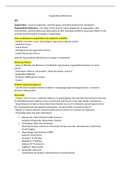College aantekeningen
Organizational Behavior (422057-B-5) aantekeningen
- Instelling
- Tilburg University (UVT)
Compacte maar duidelijke aantekeningen bij het vak Organizational Behavior. Ikzelf heb het gevolgd in jaar 1 van personeelwetenschappen aan Tilburg University. Goed cijfer gehaald met alleen de hoorcollege's samengevat en daar uitgebreide aantekeningen van te maken. Staan erg veel begrippen en mode...
[Meer zien]




